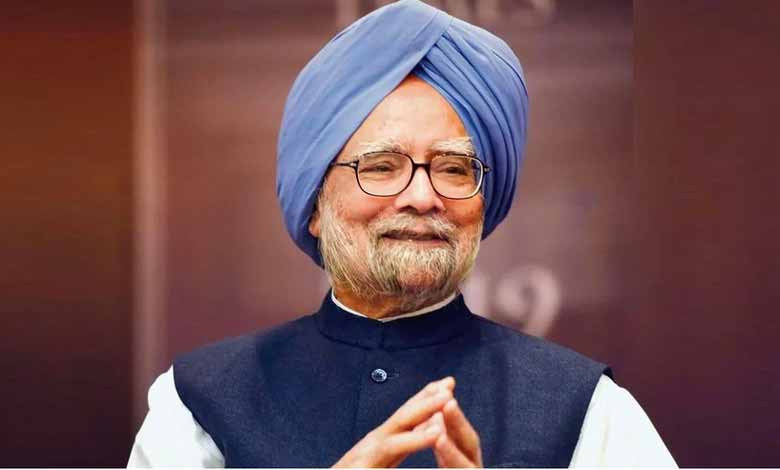Congress Cancels All Programs for 7 Days in Honor of Dr. Manmohan Singh
The Congress Party has canceled all programs for seven days to honor the late Dr. Manmohan Singh, former Prime Minister of India. The period of mourning includes the cancellation of official events, with activities set to resume on January 3, 2025.

New Delhi: In a solemn gesture of respect for the late Dr. Manmohan Singh, the Congress Party has announced the cancellation of all its programs for seven days.
This move comes in the wake of the passing of the former Prime Minister of India, Dr. Singh, who passed away on Thursday night at the All-India Institute of Medical Sciences (AIIMS), New Delhi.
Congress Announces Mourning Period
Congress General Secretary (Organization), K.C. Venugopal, took to X (formerly Twitter) to confirm the decision. He stated, “As a mark of respect for the departed former Prime Minister, Dr. Manmohan Singh Ji, all official programs of the Indian National Congress, including the Foundation Day celebrations, stand canceled for the next seven days.”
This cancellation applies to all political events, including outreach and agitational programs. The party plans to resume its activities on January 3, 2025. As a further mark of respect, the Congress Party flag will be flown at half-mast during the seven-day period of mourning.
Dr. Manmohan Singh’s Passing
Dr. Manmohan Singh, who served as India’s Prime Minister from 2004 to 2014, passed away at the age of 92 on the evening of December 26, 2024. His sudden loss of consciousness at home led to him being admitted to the AIIMS emergency department. Despite immediate medical intervention and efforts to revive him, Dr. Singh was declared dead at 9:51 PM. The AIIMS released an official statement confirming his death, citing age-related medical conditions as the cause.
Legacy of Dr. Manmohan Singh
Dr. Singh is remembered as one of India’s most influential political figures, particularly for his role in transforming the Indian economy. His leadership as Finance Minister under the government of P.V. Narasimha Rao (1991-1996) played a pivotal role in ushering in sweeping economic reforms, leading India through a crucial period of liberalization.

As the Prime Minister of India from 2004 to 2014, Dr. Singh’s tenure marked a significant era in Indian politics. Known for his calm demeanor and intellectual approach to governance, he steered the country through challenging economic times, including the global financial crisis of 2008. Dr. Singh’s legacy is particularly strong in the realms of economic growth, fiscal discipline, and economic reforms, which have had a lasting impact on India’s growth trajectory.
Political Career Highlights
Dr. Singh’s long political career was marked by a commitment to public service and national development. After first being appointed as Finance Minister in the early 1990s, he became Prime Minister after the Congress-led United Progressive Alliance (UPA) won the 2004 general elections. He was sworn in as Prime Minister on May 22, 2004, and his leadership was renewed with a second term in 2009.
Dr. Singh’s tenure as Prime Minister saw India emerge as a major player on the global stage. He was instrumental in pursuing progressive economic policies, and his government was credited with driving substantial economic growth, reducing poverty, and promoting inclusive development. His work in strengthening India’s position in international forums also cemented his legacy as a statesman.
Dr. Singh continued to serve as a member of the Rajya Sabha (the Upper House of Parliament) until early 2024, when he retired. Over the years, he represented Assam and later Rajasthan in the Rajya Sabha. He was also the Leader of the Opposition in the Rajya Sabha between 1998 and 2004, showcasing his influence in parliamentary affairs.
Mourning and Tribute
Dr. Manmohan Singh’s passing marks the end of an era in Indian politics. His contributions to India’s political and economic landscape are vast, and his leadership and wisdom have earned him the admiration of political leaders from all sides of the spectrum.
Indian political leaders, including Prime Minister Narendra Modi, have expressed their grief and respect for Dr. Singh’s remarkable career. In addition to political tributes, there is a nationwide outpouring of respect for his statesmanship and legacy.
Dr. Singh is survived by his wife, Gursharan Kaur, and their three daughters. Funeral arrangements are expected to be announced soon, and political leaders from across the country, including the Prime Minister, are expected to pay their respects and honor his memory.
The End of an Era
Dr. Singh’s leadership style was marked by a rare combination of intellectual rigor, calmness under pressure, and a commitment to democratic values. His last major intervention in Parliament, in which he strongly opposed the government’s demonetization policy, illustrated his fearless stance on national issues. His legacy as a prime architect of India’s economic liberalization, as well as his steady leadership during crises, will continue to shape India’s political and economic landscape.
His passing is not just the loss of a former leader, but a poignant moment that brings an end to an era in Indian politics. Dr. Singh’s influence will resonate for many years to come, and his legacy will serve as a guiding light for future generations of leaders.
